Kyra Vaggelio’s coffee pot hasn’t gone cold in 56 years. Her husband, Nikitas Markoulis, better known as “Tsiftis”, has taken his seat every day at his small desk, working out bills on a prehistoric calculator, for just as long.
Before that, it was his father who sat in the same seat. All in all, this kafeneio (traditional café) has been in continuous operation for 72 years. It’s doors have been open in summer and in winter, for weddings and funerals, even when south winds reached gale force and the waves covered the small veranda facing the lone port of the island of Donoussa. (Not by chance the kafeneio is called “Kyma” – “Wave” in Greek – and the coffee here has always been slightly salty.) Now, due to the coronavirus pandemic, it has closed for the first time in its long history.
For a few hours a day Giorgos, Kyra Vaggelio and Tsiftis’ son, opens it as a grocery store, while the elderly couple is forced to stay indoors, sheltered in their home. Kyra Vaggelio is struggling to bear this: “What can I say, child, I have lost the sun from my eyes,” she tells me over the phone.
I get the same news from Crete, a little over a hundred nautical miles to the south: “The kafeneia have closed!” The news has traveled at a record pace, disturbing people’s peace of mind. This momentous occurrence is as upsetting to small communities as the pandemic itself.
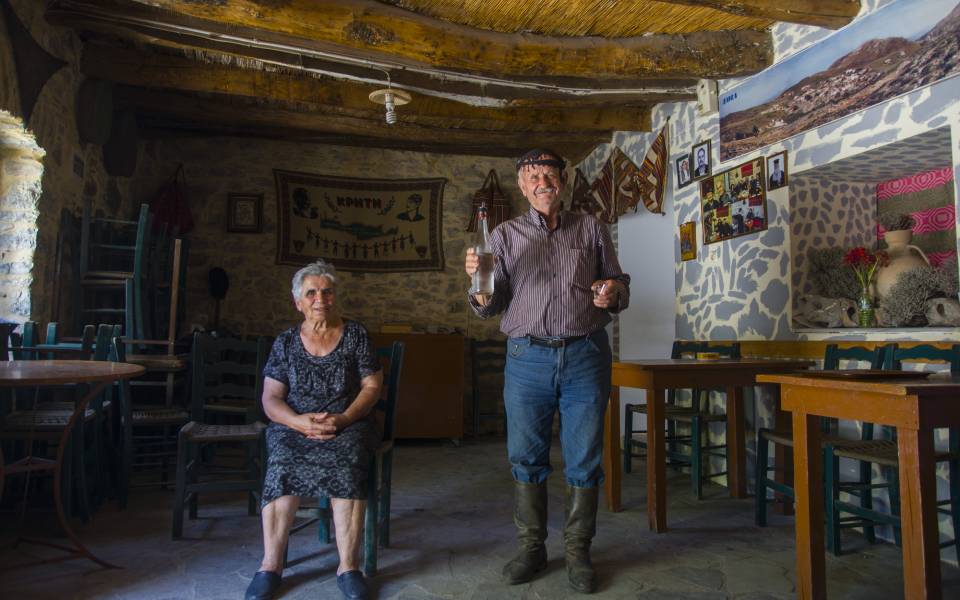
© Clairy Moustafellou
I remember a rainy day on the Lasithi Plateau in eastern Crete a few years back. We entered the kafeneio, soaking wet. The locals welcomed us and commanded the café owner: “Pour them something, it’s on us.” The glasses of raki, a strong spirit, arrived at our table. It was still morning, but turning them down was impossible. They sat us by the wood stove so we could dry ourselves, and then they turned back to their card game, unperturbed. We were lucky: in other Cretan cafés, you cannot leave before you get “olomethystos” – “entirely inebriated.” Sitting there, we found out everything there was to know: who had sold fields, who had lost their crop, who had died and who was getting married that coming summer.
At the café in Florina in the north of Greece, during another downpour, the opposite happened: it was the locals who found out everything there was to know about me: “Where are you from?” “What are you doing here?” “Where are you going next?” These interrogations, which all outsiders go through, are unforgettable and delightful, driven as they are by innocent curiosity.
Today, I wonder who to call up first: which rural microcosm has been impacted the most? They all seem to feel the same way.
Perhaps Bakogia’s on Mykonos has remained unaffected, or maybe Mouggou’s on Astypalaia, or Preka’s on Amorgos…? How do the villagers in Stemnitsa in the Peloponnese feel without their “Senate” (Gerousia)? Are they suffering from the imposed closure of Skoula’s café in Anogeia back on Crete?
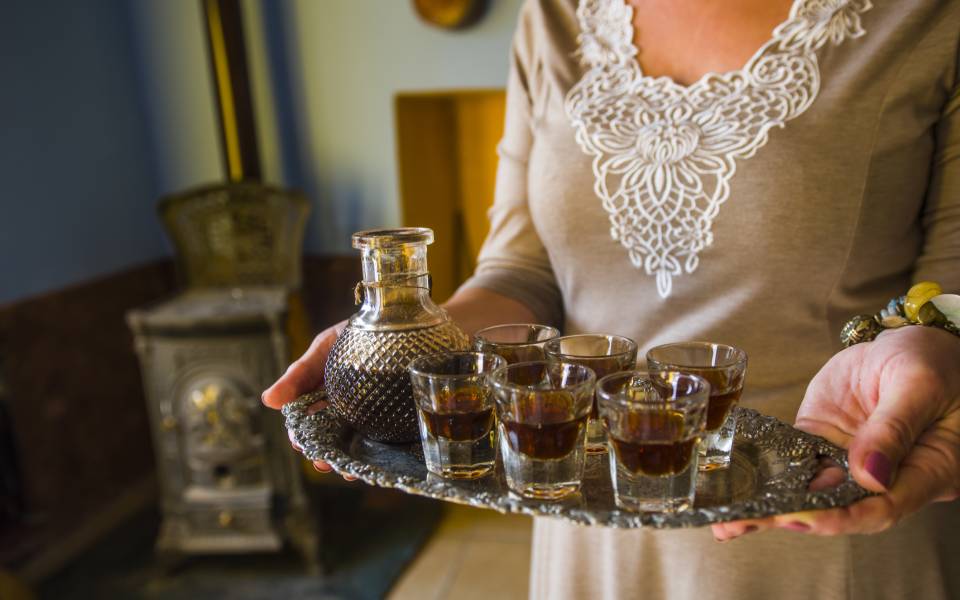
© Clairy Moustafellou
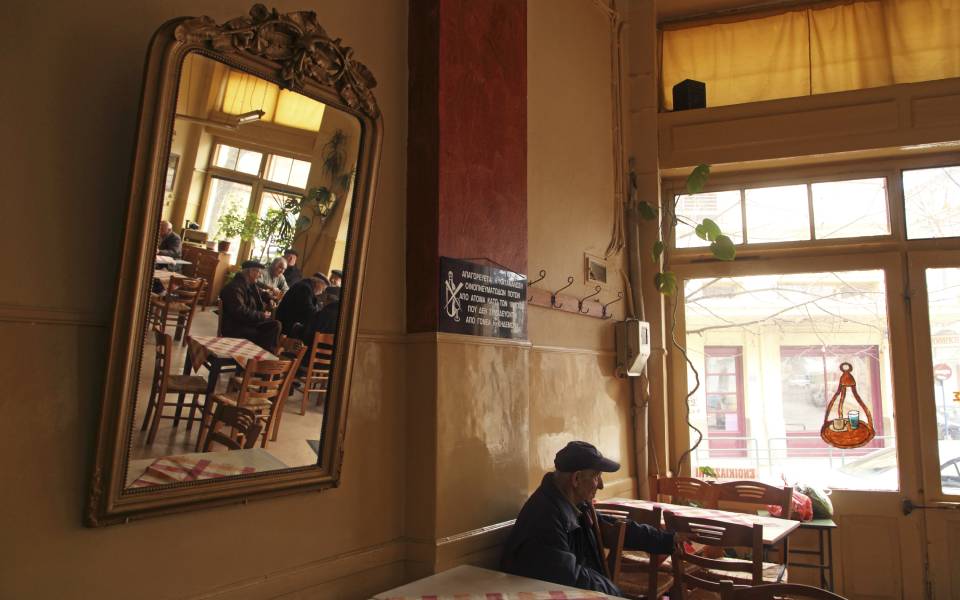
© Olga Charami
Places of vital importance
For women, it was the stoop in front of the house. For men, it was the kafeneio. Much more than a simple place to get something to eat and drink, the local kafeneio provides a form of psychotherapy.
In the 19th century, the local café was a place of leisure and entertainment, of debate, of communication. It was a place to receive visitors, and to pick up the mail. In even earlier times, kafeneia doubled as barbershops, shoemakers’ and butcher shops. A lot of them today are grocery stores as well, and this is why a few of them are permitted to stay open even now, but not as a gathering place.
In rural areas, the analysis of international and local news usually happens at the cafés, in an environment decorated by curious antiques, aged radios, maps and yellowed photographs. Political and social issues are put on the table along with glasses of spirits such as tsipouro or raki and dishes full of meze.
Someone fires up the wood stove to grill chestnuts or warm the room, the regulars pull their chairs in closer, voices are raised, debates rage and, at some point, conclusions are drawn. A decision made in the village café is has more weight than a court verdict!
The kafeneio is also a key place for visitors: it’s where they’ll find the heart of a village. Here, you can get advice on anything, or track down anyone you need. It’s where you learn about the peculiarities of a region. The number of times these cafés have rescued us upon arrival, in the dark of the night, in the different places we have visited in Greece are countless. Like an inn in the wilderness with a welcoming hearth, the kafeneio is always there for you, humbly offering a simple but bracing drink, a few olives, a piece of cheese and a refuge.
The kafeneio is, in short, a therapeutic place, and the café owner could easily be considered a social worker. This raises the following question: With the events that are currently unfolding, is it possible to go without the services of these institutions, and the communication that they facilitate?
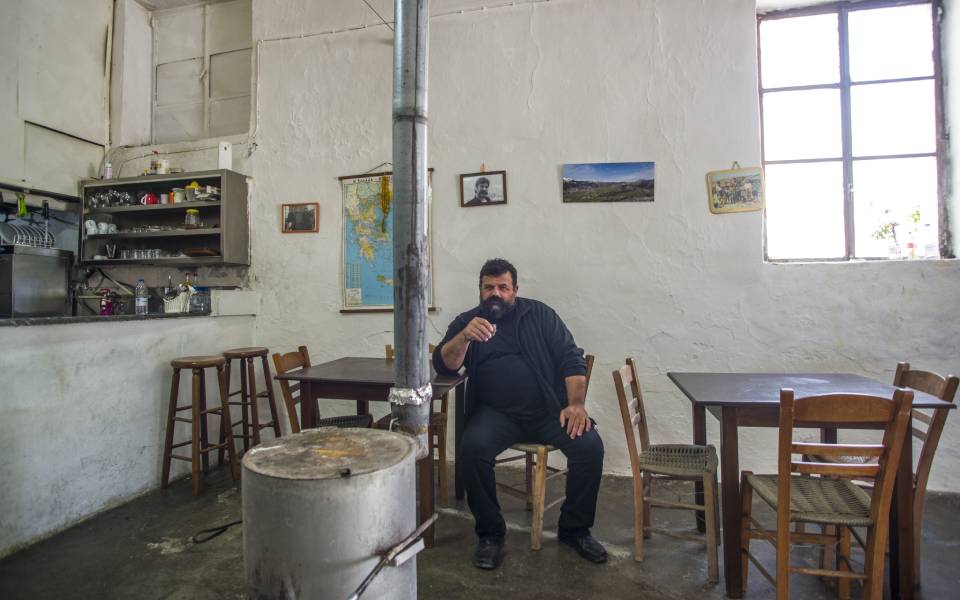
© Clairy Moustafellou
“We will drink the rakis by the dozen!”
In some villages, kafeneio regulars have found a way to keep the communal aspects of the café alive. In Donoussa, people bring their coffee from home and go sit on the benches around the port, maintaining the requisite 2-meter distance between them. Their voices are louder now as they call out to one another; let’s hope the south wind does not pick up and force them back inside.
In Lafkos on Mt Pelion, at the oldest operating kafeneio in Greece, 79-year-old owner Manolis Forlidas is having trouble dealing with the situation: “We’ve been open since 1785. We haven’t been closed for a day in 235 years, except for one small renovation. From father to son, there have been seven generations of Forlidases here. I can’t believe that I won’t get up in the morning to go to the café. I kept going until the complete lockdown. I went to open the window to let some air in, and to look around a bit. But to see what? Nothing. I only went out of habit.”
There are 400 residents in Lafkos, most of them elderly, who used to come to the kafeneio – which was once also a taverna, a butcher’s shop, a barber’s and an inn – early in the morning before their daily tasks and then return again in the evening for a game of cards, or backgammon. About the closure, Forlidas says: “The villagers are downhearted over it, but they’re scared, too.”
In Sfakia on Crete, Nektarios Tsitsiridis has closed shop. He thought about continuing as a takeout operation, serving coffee in plastic cups, but quickly rejected it. Tsitsiridis, with his beard and Cretan leather boots, becoming a barista… surely that would have meant the end of days! Of course, he didn’t do it because: “The coffee here isn’t the attraction, it’s our tsikoudies [local pomace brandies]! But if you open shop, they’ll come from the city and they shouldn’t. Let’s show some respect and stay home. You can’t do anything outside anyway. People in the village don’t like it, but they understand. May this be temporary and, when it’s over, we’ll drink rakis by the dozen.”
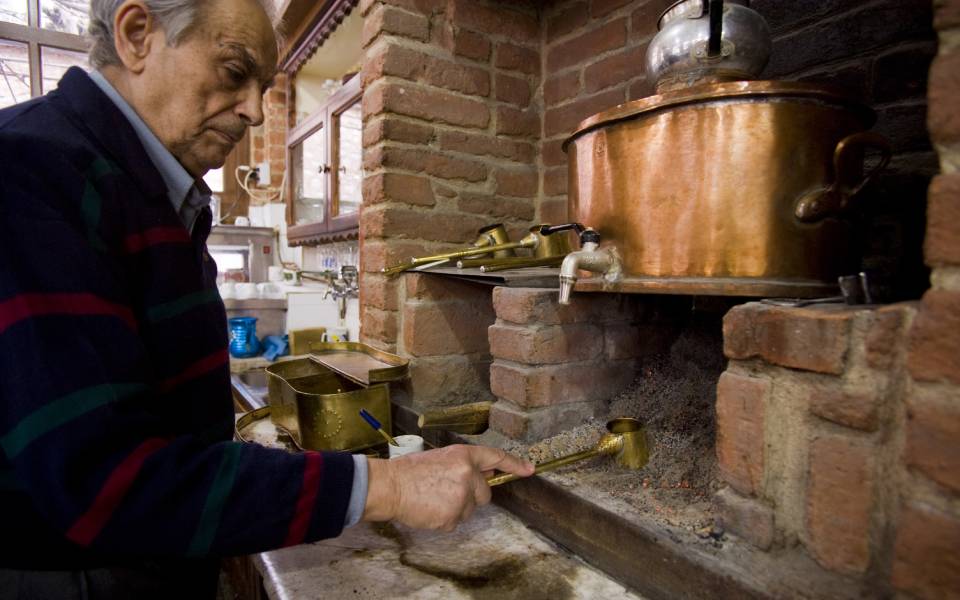
© Clairy Moustafellou
In Lesvos, where the kafeneio is as important as anywhere, the villagers have been self-isolating since before the lockdown. In the village of Agiaso, café owner Fotis Kalfagiannis describes an empty square: “There were once 15 cafés around the square. Nowadays, there are only five but they’re always full, especially after the church service. Except that now there’s neither church services nor a café.”
I think about this past summer, about sitting at a 19th-century kafeneio drinking coffee made in the traditional way on hot coals, or sipping the local “kaïnari” beverage, or eating their homemade rice pudding, and immediately my thoughts turn to the present and I imagine the locals walking round and round aimlessly, their hands clasped behind their backs. “They miss it a lot. It’s their entertainment,” Kalfagiannis says calmly.
On a typical day at the “Diethnes” café in the city of Florina in the north, you’ll find the older generation playing cards and reading the newspapers in the morning and their younger counterparts taking a break for tsipouro and meze at noon; together they create a continuous, pleasant hum of activity. The fact that you’re in the city doesn’t make the experience different; it’s a beloved hangout with a century of history behind it, and suddenly, now, it’s closed.
Owner Damianos Vellianis describes the situation: “My regulars are panicking. They stop me on the street and ask me what’s going to happen, and when I will reopen? They miss their everyday life, they miss the company. It has taken a toll.” And it will keep taking a toll, for a little while longer, although nobody can say for precisely how long.
But sooner or later, the Greek countryside will rediscover its normal rhythms and, of course, its sounds: dice clattering on the backgammon board, questions asked in earnest, and the voices of villagers sitting at the kafeneia, inviting you to “Come on over!”












